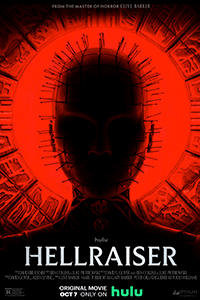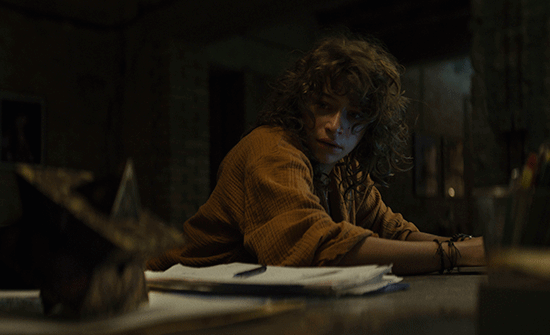
Reader's Choice
Reviews commissioned and selected by Patrons
Hellraiser
2 Stars- Director
- David Bruckner
- Cast
- Odessa A'zion, Jamie Clayton, Brandon Flynn, Goran Visnjic, Drew Starkey, Adam Faison, Aoife Hinds, Selina Lo, Hiam Abbass
- Rated
- R
- Runtime
- 120 min.
- Release Date
- 10/07/2022

When a Cenobite presents you with a deal, pass on the offer, no matter how good it sounds. Even if they promise you untold insights into life, love, knowledge, sensation, power, or resurrection—all you have to do is pick one—choose none of them, and slowly back out of the room. No matter which option you select, the result will be the same. In all likelihood, every choice results in you being tortured horrifically in ways you couldn’t imagine. Your skin will be flayed and arranged into elaborate designs, your flesh will be penetrated by various metal rods and wires, and some of your insides will be brought outside. That happens when you try to bargain with one of the interdimensional perverts from Hellraiser. The sadomasochistic Cenobites return to the (small) screen in David Bruckner’s new film, representing this long-running franchise’s first entry to warrant attention in years. The remake may recast and redesign the hellish pleasure fiends for a new generation of horror buffs, but the Cenobites remain up to their old tricks.
For the uninitiated, Clive Barker wrote the literal book of Hellraiser with his 1986 novella, The Hellbound Heart. The following year, he made his directorial debut turning his story into a low-budget work of gruesome horror cinema, Hellraiser, whose iconic status stems from its gory effects and the appearance of its central villain—an unnamed Cenobite priest, colloquially known as “Pinhead” for the pins jammed into his bald skull in an orderly fashion. Based mainly on the strength of Pinhead and his freaky-looking cohorts, Hellraiser spawned nine sequels between 1988’s Hellbound: Hellraiser II and 2018’s Hellraiser: Judgment. In between, you have forgettable sub-titled sequels from Inferno to Hellseeker to the laughable Deader, and the scenarios range from “Pinhead in space” to “Pinhead in a video game.” Most of the schlocky sequels debuted on the shelves of Blockbuster, but since video stores aren’t around anymore, the reboot follows suit by skipping a theatrical release for a premiere on Hulu.
Written by Ben Collins and Luke Piotrowski, who also wrote the screenplay for Bruckner’s last film, The Night House (2021), the new Hellraiser starts afresh and remains unconnected to the previous ten entries. The story involves Roland Voight (Goran Višnjić), a wealthy weirdo who has experienced every debauched sensation money can buy on Earth. Now, he wants an audience with the Cenobites for more. So at his mansion in the Berkshires—home to orgies and a room filled with various torture devices, such as a Pear of Anguish—he convinces an unsuspecting sex worker to figure out a mechanical puzzle box. As we eventually learn, the box has six configurations, and each one invites the Cenobites to claim a human sacrifice. After six human offerings, the holder receives a gift courtesy of the Cenobite god (in the form of the aforementioned life, love, knowledge, sensation, power, or resurrection). Obsessed by new sensations, Voight hopes to find the limits of his desires. But as I suggested earlier, the Cenobites’ idea of a gift isn’t what Voight had in mind.
Admittedly, I have never been a fan of the Hellraiser franchise, even while I recognize that Barker’s original Pinhead imagery remains iconic—his spiky cranium belongs on the Mount Rushmore of horror, right next to Freddy Kruger, Ghostface, Jason Voorhees, and Leatherface. The Hellraiser movies, the early ones anyway, usually feature impressive practical effects and production design. However, my issue with the Hellraiser series is that there’s not much motivating the Cenobites besides finding others to endure their leather, chains, and body disfigurements. Usually, there’s even less driving the human characters, whose horniness and curiosity prove fatal. Fortunately, the writing on Bruckner’s remake gives the characters some mild gradation. Six years after Voight’s encounter with the Cenobites, the story centers on Riley (Odessa A’zion), an addict in treatment for pills and alcohol. But her inner pain and list of vices make her the perfect pawn for the Cenobites.
 At the very least, Riley offers a convincing protagonist who feels more real than the cardboard victims of earlier Hellraiser fare. She lives with her brother Matt (Brandon Flynn), his boyfriend Colin (Adam Faison), and their roommate Nora (Aoife Hinds)—all beleaguered by Riley’s unpredictable behavior. When Riley’s boyfriend Trevor (Drew Starkey) convinces her to rob a storage container managed by his former employer, they hope to find something they can pawn. Instead, they find only the golden, ornamented puzzle box that calls the Cenobites. Riley, being the kind of person who sees a hole and sticks her finger inside, soon tampers with the box and inadvertently prompts the Cenobites to claim Matt. One configuration down, five to go. Plagued by visions of the Cenobites and their voices whispering initially cryptic taunts (“If not you, then another.”), Riley teams with her friends to find the box’s origin and track down its owner, hoping they can restore Matt.
At the very least, Riley offers a convincing protagonist who feels more real than the cardboard victims of earlier Hellraiser fare. She lives with her brother Matt (Brandon Flynn), his boyfriend Colin (Adam Faison), and their roommate Nora (Aoife Hinds)—all beleaguered by Riley’s unpredictable behavior. When Riley’s boyfriend Trevor (Drew Starkey) convinces her to rob a storage container managed by his former employer, they hope to find something they can pawn. Instead, they find only the golden, ornamented puzzle box that calls the Cenobites. Riley, being the kind of person who sees a hole and sticks her finger inside, soon tampers with the box and inadvertently prompts the Cenobites to claim Matt. One configuration down, five to go. Plagued by visions of the Cenobites and their voices whispering initially cryptic taunts (“If not you, then another.”), Riley teams with her friends to find the box’s origin and track down its owner, hoping they can restore Matt.
Fans of the original Hellraiser will note that Bruckner’s production has altered the look of Pinhead and the other Cenobites, who usually appear in black leather S&M getups interlaced with hunks of flesh. Here, they’ve ditched the leather entirely; their skin has been folded, decoratively placed, and penetrated with metallic objects, but they’re ostensibly nude. Still, there’s no trace of nipples or genitalia—all of those bits have been integrated into their body-morphed costumes. Jamie Clayton, star of the Wachowskis’ Netflix series Sense8, plays Pinhead in a more feminine appearance than the earlier version played by Doug Bradley—a detail that proves truer to Barker’s original concept for the character in his book. But these neato alterations don’t make the Cenobites any more compelling. They utter sometimes unintelligible dialogue in their froggy voices and, as dunderheaded movie maniacs, they walk slower than your average zombie and often into obvious traps.
Regardless, the new Hellraiser might be a better film than the original, partly because Bruckner is a more assured filmmaker than Barker. The script propels Riley on a mission to uncover the Cenobites’ secrets and find out what happened to Matt, and Bruckner keeps the momentum rolling forward. But cinematographer Eli Born’s use of darkness borders on imperceptible. And I’m not one of those viewers who complained about the shadowy Game of Thrones episode in the final season; I have a television that can properly render dark scenes with clarity. Even so, I had to strain to see Bruckner’s nighttime scenes and gnarly deaths due to the pervasive blackness onscreen. “Oh yes, we have such sights to show you,” Pinhead is famous for saying, but good luck seeing them. Even the production stills provided by the studio’s press kit appear underlit. Along with the Cenobites’ croaking voices that perplex the eardrums, Hellraiser’s audiovisual presentation made me flash forward to my elder years, when my senses will have dulled and left me generally confused. Luckily, the characters spend so much time recapping what’s happening that I was able to keep up, if a little humbled by the strain on my senses.
At times, I was impressed by Hellraiser. There’s a clever sequence where Riley’s roommate Nora finds herself in the back of a van, targeted by the Cenobites. When they arrive to collect her, the victim sees hallucinations—the back and front of the van begin to separate, extending outward with the appearance of a damp corridor. In rare moments like this, Bruckner demonstrates that he knows how to orchestrate a visually inspired scene (most of The Night House is evidence of that). Bruckner’s Hellraiser represents a vast leap forward for the franchise and boasts a polish that the previous entries lack, but that isn’t saying much. Besides the phlegmatic voices and darkness that might prompt one to check their screen’s brightness settings, Bruckner delivers a serviceable story with few surprises. But not even someone of his talents can make these characters or situations feel like more than a surface-level cautionary tale about exploring our thresholds.
(Note: This review was originally suggested on and posted to Patreon on October 13, 2022.)






 The Fly
The Fly  Scream 2
Scream 2  Humanist Vampire Seeking Consenting Suicidal Person
Humanist Vampire Seeking Consenting Suicidal Person